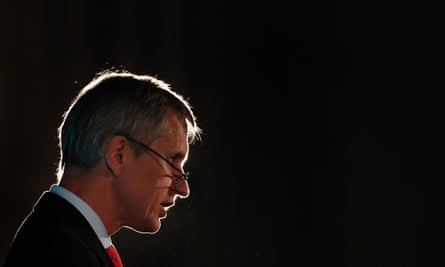George Osborne has forced out the tough-talking head of Britain’s financial watchdog after he angered the banking community with a string of record fines.
Martin Wheatley quit as chief executive of the Financial Conduct Authority after he was told earlier this week by the chancellor that his five year contract would not be renewed next year.
The chancellor’s vote of no confidence immediately prompted speculation that it was Wheatley’s attacks on bank misbehaviour which had generated a loss of support inside No 11.
John Mann MP, a member of the influential Treasury select committee, said the chancellor was “wrong” and the decision “undermined the independence of the regulator”.
The watchdog’s remit to clamp down on misselling prompted it to levy a record £1.4bn in fines last year and keep a focus on bank efforts to clean up their acts in the wake of the £20bn payment protection insurance scandal.
Sources close to the Treasury denied that Wheatley’s departure would bring a more softly-softly approach, saying that his successor would still get support for tackling poor practice in the City.
Osborne said: “Britain needs a tough, strong financial conduct regulator. Martin Wheatley has done a brilliant job of launching the FCA in tough circumstances.
“Now that phase is complete, the government believes that different leadership is required to build on those foundations and take the organisation to the next stage of its development.
“The government is launching a worldwide search; Martin’s replacement will – like him – need to be passionate about protecting consumers, promoting competition and completing the job of cleaning up the City, so it is the best-regulated market in the world.”
However, Mann said: “To play politics with our biggest financial regulator shows the chancellor hasn’t learnt the lessons of the financial crash.
“Martin Wheatley has led the FCA with distinction since its creation following the failures of the FSA. Under his watch the biggest banks have been held accountable for their failings, predatory payday lenders have been brought to task and consumers have finally had someone stand up for them.”
It is understood that several banks and insurers have complained to the chancellor about the FCA under Wheatley, whom they accuse of having a “guilty until proven innocent” attitude to regulation. Wheatley, who helped set up and spearhead the chancellor’s beefed-up regulator in its first two years, famously said he would “shoot first and ask questions later” at the launch of the watchdog.
The FCA is the second pillar of the chancellor’s regulatory system alongside the Bank of England’s financial policy committee, which supervises the financial security of the banking and insurance sectors to prevent a repeat of the 2008 financial crisis.

Wheatley, who was also head of the FCA’s predecessor, will continue to act as an adviser to the FCA board until 31 January next year, the regulator said, to help implement the Fair and Effective Markets Review, which he co-chaired.
John Griffith-Jones, the FCA chairman, said: “Martin has done an outstanding job as chief executive setting up and leading the FCA over the last four years. We owe him a lot and I and my board would like to thank him for his great efforts in setting up the organisation and for the contribution he has made to putting conduct so firmly at the top of the financial services agenda.”
Wheatley said the FCA would “build on that strong start and work so that the financial services industry continues to thrive”.
Tracey McDermott, currently director of supervision, will take over as acting chief executive from 12 September while the search for a permanent chief executive takes place.
Wheatley’s low points
Insurance
The FCA told the Daily Telegraph in March 2014 that it would review 30m closed life insurance policies going back decades and potentially scrap exit fees on such policies. Around £6bn was wiped off insurance company shares when the report appeared. FCA executive Clive Bannister, who made the comments in an exclusive interview, fell on his sword and there was an official enquiry. Wheatley, however, managed to keep his job.
HBOS
Even though seven years have now passed since the banking crisis the former directors of HBOS – which had to be rescued by Lloyds in a shotgun takeover – have so far escaped censure . The FCA has repeatedly failed to produce a report on former chief executives James Crosby and Andy Hornby or ex-chairman Lord Stevenson, or even say when its report will be published.
Wheatley’s high points
Fines
The FCA imposed fines of £1.4bn during the last financial year 2014-15, more than for the previous four years combined. Bosses at Lloyds Banking Group forfeited almost £33m in past and future bonuses after the bank paid a record fine of £117m for the mishandling of PPI complaints. Barclays paid a record £284m for “unacceptable practices” relating to forex trading. Five other global banks were also hit with heavy penalties.
Last year, Ian Hannam, the former chairman of capital markets at JPMorgan and one of the City’s star investment bankers, lost the fight to clear his name after the regulator fined him £450,000 for disclosing to a client inside information about a potential takeover of the oil and gas company Heritage.

Comments (…)
Sign in or create your Guardian account to join the discussion